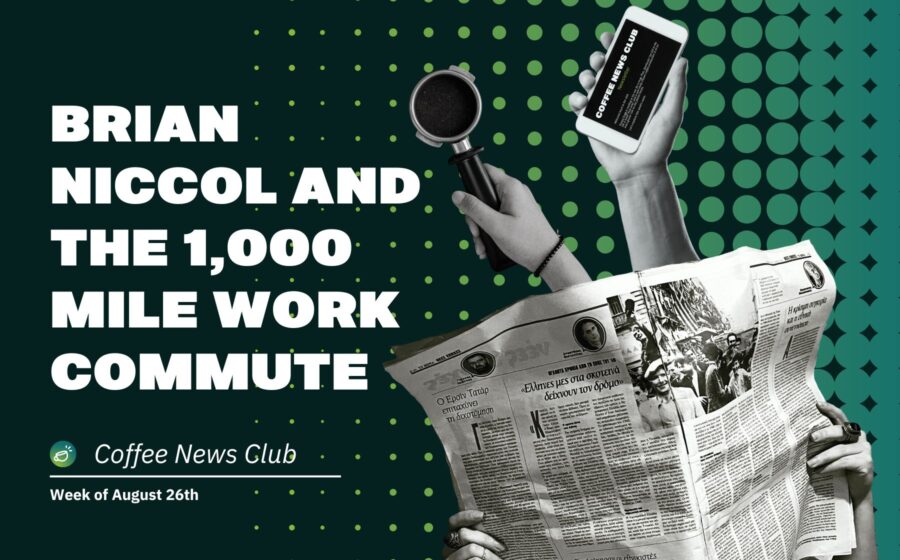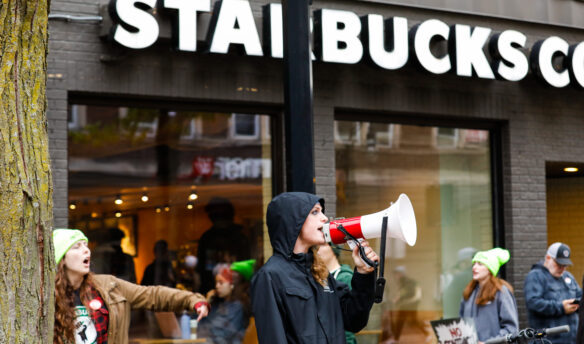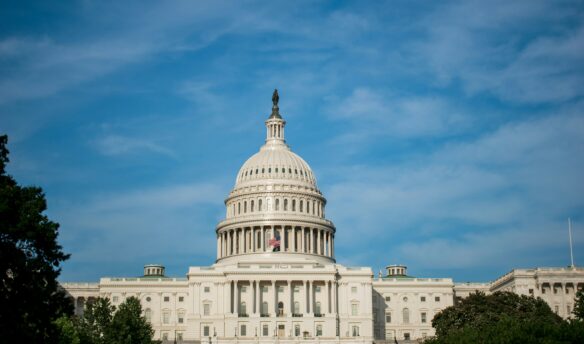Starbucks’ new CEO will commute 1,000 miles to his job. Plus, co-roasting spaces boost San Francisco’s coffee scene, and there’s good and bad news on the coffee health front.
‘Love SF’s Cutting-edge Coffee Scene? Thank Affordable Roasting Co-ops’ – via The San Francisco Standard
If you’ve noticed a lot of cool and innovative roasting businesses coming out of San Francisco, you’ve got co-roasting spaces, where people can rent time on a roasting machine and access machinery and tools that would cost thousands of dollars to buy outright, to thank.
In many ways, starting a coffee roasting company has never been easier. However, for many aspiring founders, items like equipment and packaging are still expensive and out of reach. That’s where roasting co-ops come in, where people can rent time on a roasting machine and access machinery and tools that would cost thousands of dollars to buy outright.
The Bay Area has several roasting co-ops, which, according to Paolo Bicchieri for the San Francisco Standard, is letting “a new class of scrappy companies [make] some of the most exciting coffees in the Bay.”
Depending on the co-op, folks who want to roast can access roasting machinery, packaging equipment, and storage for green coffee. “With access to communal space and equipment, plus a cohort of other small-business owners to lean on, the facilities make starting or growing a coffee company relatively easy,” Bicchieri reports. Co-ops are especially beneficial in cities like San Francisco—one interviewee estimates that it is 30% more expensive to start a coffee company in the city than elsewhere in the United States.
Co-ops let aspiring coffee roasters start a company on a small scale. Tanya Rao launched Kaveri Coffee Works in 2019 and roasts at CoRo in Berkeley, just north of Oakland, sourcing coffee from her home country of India. Bill Li also roasts out of CoRo: his business, Hydrangea Coffee Roasters, focuses on light-roasted and co-fermented coffees.
Co-roasting spaces allow founders to network, and many spaces offer educational opportunities as part of membership. The shared costs of starting a coffee company also brings a kind of camaraderie. “It’s such a tight-knit community,” Phillip Roliz of Sunset Rosters says. “In a world where real estate is so expensive, where labor is so expensive, we eat the cost together.”
‘Starbucks is So Desperate for Sales It’s Pulling Out the Big Guns—the Pumpkin Spice Latte—Earlier Than Ever Before’ – via Fortune
Analysts have claimed Starbucks has been struggling recently—in the first quarter of 2024, the global brand raked in $8.56 billion, a 2% decrease from the previous quarter. Its stock price has slipped, falling 20% this year. Despite this, the company is giving its new CEO, Brian Niccol, a compensation package estimated to be worth $113 million.
The move had a positive effect—when Starbucks announced Niccol would be taking the top spot, its stock price jumped 25%. But that’s not the only way the brand is trying to increase sales.
Starbucks announced that its crowd-pleasing Pumpkin Spice Latte would hit menus on August 22, earlier than ever unveiled. The drink is generally rolled out in September, and Daniela Sirtori for Fortune suspects the move is an attempt to boost the company’s flagging sales.
“The fall product lineup is taking on extra weight this year after the coffee chain ousted its chief executive officer in a surprise move last week,” Sirtori writes. “Fan-favorite autumn beverages are key to the company’s plan to reverse two quarters of same-store sales declines.”
CNN reports that seasonal drinks make up about 10% of Starbucks’ overall sales, so the company has a clear incentive to use the PSL to entice customers to its stores. And it’s not the only coffee brand pushing fall favorites before the equinox—Fresh Cup editor Ashley Rodriguez recently explored the trend of ever-earlier PSL launches. 7-Eleven, for example, announced a brand new Pumpkin Spiced Slurpee on August 1, or “the middle of summer,” as some may say.
More News
‘The Chinese Coffee Market Gives Some U.S. Brands Headaches’ – via Restaurant Business Online
‘Mexico Closes Out 2024 Central America Cup of Excellence Program‘ – via Global Coffee Report
‘Brazilian Coffee Frost Causes Price Surge‘ – via STiR Coffee & Tea
‘All About Coffee, a Page by Page Podcast Is As Ambitious As It Sounds‘ – via Sprudge
‘Vauxhall Made a Car with a Wild Coffee Setup in the Trunk‘ – via Daily Coffee News
‘Starbucks is Sued Again for Alleged Stealing Concept for Coffee-Flavored Lipstick‘ – via Reuters
‘This Coffee Just Set a New World Record, Selling at $10,013 per Kilogram‘ – via Food & Wine
‘SCA Reprises’ Educator Summit’ Program with Events in Philadelphia, Houston’ – via Daily Coffee News
‘Snoop Dogg Just Opened A Coffeeshop In Amsterdam’ – via Sprudge
The Week in Corporate Coffeewashing
Starbucks works hard to portray itself as a sustainable brand. On the company’s blog, they say Starbucks “has a bold aspiration to be a resource positive company.”
Plans include cutting greenhouse gas emissions by half by 2030, working with farmers to decrease its dairy supply chain emissions, and making its green coffee carbon neutral by the decade’s end. Starbucks has also phased out plastic straws and plans to eliminate disposable cups by 2030.
However, the company recently revealed that new CEO Niccol will commute 1,000 miles by corporate jet for his job, from his home in Newport Beach to Starbucks headquarters in Seattle. This is apparently a trend among big companies: offer private jet-based “supercommutes” as a perk to attract their desired chief executives.
Niccol’s planned commute led to immediate backlash from customers and activists, who pointed out the hypocrisy of the decision. “As the world faces unprecedented heat waves, droughts, floods and other dire consequences of an accelerating climate crisis, it is unjustifiable for companies to offer company aircraft as employee perks,” Clara Thompson, a Greenpeace climate activist, told the Washington Post. “These jets are a stark symbol of social and climate injustice, where a privileged few indulge in the most environmentally damaging form of travel for mere convenience.”
Fast Company calculated that Niccol’s supercommute will emit 1,000 tons of CO2 annually, more than 60 times the amount the average American generates.
Is Coffee Good For You?
This week, there’s good and bad news in the never-ending quest to determine if coffee is good for you. New research indicates that higher coffee consumption could lead to an increased risk of cardiovascular disease, but drinking coffee was also linked to increased skeletal muscle mass, which could benefit us as we age.
First, the good: researchers at Guangxi Medical University in Nanning, China, studied muscle mass and its connection to coffee consumption in 8,333 American participants in the National Health and Nutrition Examination Survey. Muscle mass is known to decrease after age 50, and upwards of 40% of people over 80 suffer from sarcopenia, a chronic disease that involves the loss of skeletal muscle mass and function.
For this study, published in Frontiers in Nutrition, participants’ muscle mass was calculated using dual-energy X-ray absorptiometry scans, a type of X-ray used to precisely measure a person’s bone, muscle, or fat levels. These scans were adjusted for participants’ BMI and then cross-referenced with coffee intake questionnaires.
The study linked coffee consumption to higher levels of “appendicular skeletal muscle mass adjusted for BMI.” According to News Medical, the study “underscores the potential of coffee and caffeine consumption as a dietary strategy to support skeletal muscle mass and reduce the risk of muscle loss in adults.”
In less good news, prolonged excessive coffee consumption was linked to an increased chance of developing cardiovascular disease. The study, conducted by the American College of Cardiology, evaluated a small group of 92 participants to explore the effects of chronic caffeine consumption on heart health.
The researchers defined chronic caffeine consumption as “the intake of any caffeinated drinks five days per week for more than one year.” According to the study, regularly drinking 400mg of caffeine, roughly four cups of coffee, or more “was shown to significantly impact the autonomic nervous system, raising the heart rate and blood pressure over time.” For those who regularly drink 600mg or more, the effects were even more potent.
The study’s results affirm similar conclusions from previous research. But, Dr. Eugene Yang told Susan Kreimer, reporting for UPI, that “the jury is out regarding the long-term effects of high caffeine intake and cardiovascular events.”
Other experts point out that the study was only done on 92 participants, so the results can’t be considered conclusive. Factors like individual differences in metabolism could also impact the impact of caffeine. “The amount of caffeine will affect different people differently,” said Dr. Gregory Marcus, chair-elect of the American Heart Association’s committee on drugs, alcohol, and tobacco. “Each of us have a number of genes that determine how fast or slow we inherently break down caffeine.”
Beyond the Headlines
‘Opinion: Large Roasters Urge EUDR Delay, But Where’s the Culpability?’ by Nick Brown














